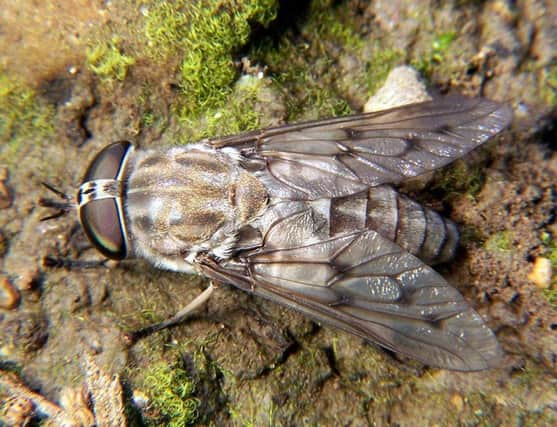Advice to be pest aware following reported surge in fly bites


The heatwave is being linked in the media to an increased number of bites and stings, particularly from horseflies.
BPCA has received enquiries from across the country – and says that rural areas are more likely to see an increase in numbers due to the presence of livestock, and access to standing water in troughs, ponds and marshes, which provide a food source and an environment to breed.
Advertisement
Advertisement
Natalie Bungay, BPCA Field Officer, says that while the prolonged soaring temperatures mark a clear change in weather patterns for the UK, it is unclear what has caused the surge in insects.
One theory is that as the UK soaks up the rays, more people are outdoors than usual, increasing the opportunity for insects to bite and sting.
Ms Bungay said: “After a prolonged period of hot weather, or rather without cold and uncomfortable conditions for invertebrate pests, insect numbers may see an increase and infestations can develop if left alone.
“This, for some invertebrate species, is more likely to be rural locations, which will generally have more available breeding opportunities in ponds, marshes and other types of standing water.
Advertisement
Advertisement
“For blood sucking insects such as horseflies, the countryside also gives access to food sources, mainly cows and horses grazing in fields.
“Horseflies and mosquitos are interesting because they rely on aquatic larvae in wet and marshy areas, which won’t have necessarily dried up yet, even after the last four weeks of hot and dry weather conditions.
“We continue to receive enquiries and have noted coverage in the media, but there is nothing to substantiate a significant increase in activity.
“If members of the public do have an issue, we strongly encourage you to contact a BPCA member to get any problems resolved rapidly, and professionally.”
Advertisement
Advertisement
According to BPCA, the top five most common bites and stings are false black widow spider, mosquitos, horse flies, wasps and hornets.
Ms Bungay added: “Horsefly bites are particularly painful because their main food source is livestock, which have a limited ability to move the fly away.
“This means they can take their food without having to worry about delivering a painful bite, as the animals are generally powerless to stop them.
“This is as opposed to mosquitoes, which extract blood through a painless bite.”
Advertisement
Advertisement
BPCA advises the public to be pest aware and on their guard against bites and stings, by taking steps such as removing standing water from the proximity of their homes and areas of the garden used in the summer. Medical advice should be sought if problems emerge, such as swelling.
Horseflies, or clegs as they are commonly known, are bloodsucking insects commonly found in Britain and can grow up to 1-1/4 inches in length. Peak time for the insect in the UK is between May and September and one Wildlife Trust warned that this year the UK is seeing populations more like you would expect in the Mediterranean, due to the warmer weather.
Whilst the male horsefly feeds off nectar, the female horsefly feeds off animals, including humans, by sucking their blood so she can produce eggs.
The female will lay around 25 to 1,000 eggs in damp wetland areas and also in grassy woodland areas. It’s their jagged, razor sharp teeth that cause the damage though – and even just one bite from the bloody thirsty bug could leave unsuspecting victims in a great deal of pain.
Advertisement
Advertisement
“A bite from a horsefly can be very painful and the bitten area of skin will usually be red and raised,” NHS Choices says. “Horsefly bites can take a while to heal and can become infected. See your GP if you have symptoms of an infection, such as pus or increasing pain, redness and swelling.”
According to the NHS symptoms of horsefly bites include a larger red, raised rash, dizziness, weakness and wheezing. A part of the body may also become puffy and swollen.
In rare occasions an allergic reaction to the fly can prove fatal and in 2013 a father of four died suddenly after being bitten by the fly. If you’re bitten by a horsefly, keep the wound clean and apply ice to minimise the itching.
Details of how to find a BPCA member can be found at bpca.org.uk/PestAware